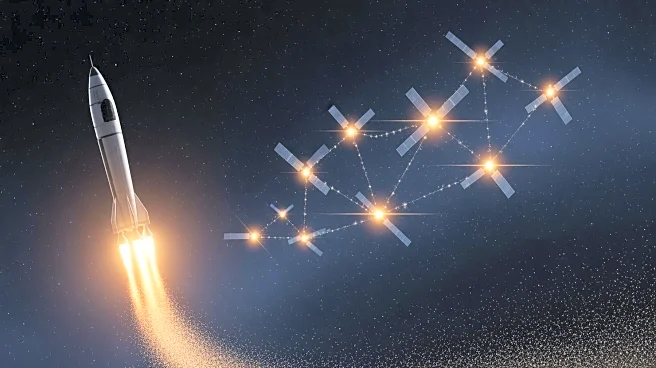What's Happening?
SpaceX has successfully launched its 135th orbital mission of the year, deploying 28 Starlink satellites into low Earth orbit. The launch took place on October 25, 2025, from California's Vandenberg Space Force
Base. This achievement marks a new record for SpaceX, surpassing the previous record set in 2024. The Falcon 9 rocket used for this mission returned to Earth, landing on the drone ship 'Of Course I Still Love You' in the Pacific Ocean. This particular booster, designated 1081, has now completed 19 launches and landings. SpaceX has been consistently breaking records, including the recent launch of the 10,000th Starlink satellite and the 31st flight of the Falcon 9 booster known as 1067.
Why It's Important?
The record-breaking launch underscores SpaceX's growing dominance in the satellite-launch industry. The deployment of Starlink satellites is part of SpaceX's ambitious plan to create a megaconstellation aimed at providing global internet coverage. This expansion has significant implications for telecommunications, potentially increasing internet accessibility worldwide. However, SpaceX faces regulatory challenges and environmental concerns related to the large number of satellites in orbit. The successful launch also highlights the reliability and efficiency of the Falcon 9 rocket, which has become a cornerstone of SpaceX's operations. The company's ability to reuse boosters effectively reduces costs and increases the frequency of launches, setting a new standard in the aerospace industry.
What's Next?
SpaceX is expected to continue its aggressive launch schedule, with plans to expand its Starlink constellation further. The company is also progressing with its Starship launch system, which could enable larger-scale satellite deployments in the future. Regulatory bodies may continue to scrutinize SpaceX's activities, particularly concerning space debris and orbital congestion. As SpaceX pushes forward, other stakeholders in the aerospace industry may need to adapt to the changing landscape, potentially leading to increased competition and innovation. The broader impact on global internet access and telecommunications infrastructure will be closely monitored by industry experts and policymakers.
Beyond the Headlines
The rapid expansion of SpaceX's satellite network raises ethical and environmental questions about the sustainability of space activities. The potential for increased space debris and its impact on existing satellites and space missions is a growing concern. Additionally, the deployment of thousands of satellites could affect astronomical observations, prompting discussions about balancing technological advancement with scientific research. The long-term implications of SpaceX's activities may influence future regulations and international agreements on space exploration and satellite deployment.










